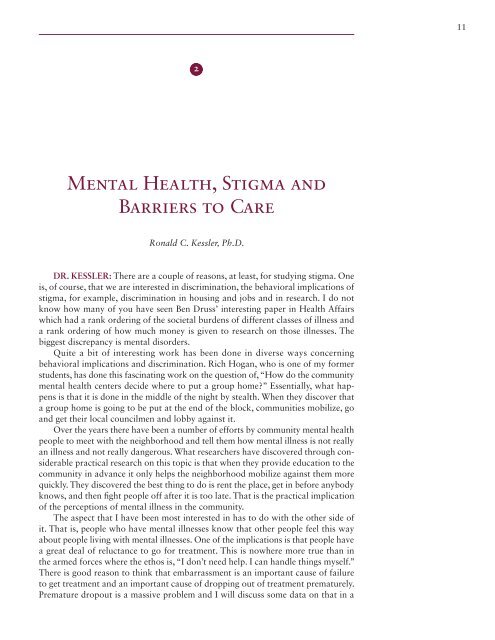stigma and barriers to care - Uniformed Services University of the ...
stigma and barriers to care - Uniformed Services University of the ...
stigma and barriers to care - Uniformed Services University of the ...
You also want an ePaper? Increase the reach of your titles
YUMPU automatically turns print PDFs into web optimized ePapers that Google loves.
Mental Health, Stigma <strong>and</strong> Barriers <strong>to</strong> Care 11<br />
2<br />
Mental Health, Stigma <strong>and</strong><br />
Barriers <strong>to</strong> Care<br />
Ronald C. Kessler, Ph.D.<br />
DR. KESSLER: There are a couple <strong>of</strong> reasons, at least, for studying <strong>stigma</strong>. One<br />
is, <strong>of</strong> course, that we are interested in discrimination, <strong>the</strong> behavioral implications <strong>of</strong><br />
<strong>stigma</strong>, for example, discrimination in housing <strong>and</strong> jobs <strong>and</strong> in research. I do not<br />
know how many <strong>of</strong> you have seen Ben Druss’ interesting paper in Health Affairs<br />
which had a rank ordering <strong>of</strong> <strong>the</strong> societal burdens <strong>of</strong> different classes <strong>of</strong> illness <strong>and</strong><br />
a rank ordering <strong>of</strong> how much money is given <strong>to</strong> research on those illnesses. The<br />
biggest discrepancy is mental disorders.<br />
Quite a bit <strong>of</strong> interesting work has been done in diverse ways concerning<br />
behavioral implications <strong>and</strong> discrimination. Rich Hogan, who is one <strong>of</strong> my former<br />
students, has done this fascinating work on <strong>the</strong> question <strong>of</strong>, “How do <strong>the</strong> community<br />
mental health centers decide where <strong>to</strong> put a group home” Essentially, what happens<br />
is that it is done in <strong>the</strong> middle <strong>of</strong> <strong>the</strong> night by stealth. When <strong>the</strong>y discover that<br />
a group home is going <strong>to</strong> be put at <strong>the</strong> end <strong>of</strong> <strong>the</strong> block, communities mobilize, go<br />
<strong>and</strong> get <strong>the</strong>ir local councilmen <strong>and</strong> lobby against it.<br />
Over <strong>the</strong> years <strong>the</strong>re have been a number <strong>of</strong> efforts by community mental health<br />
people <strong>to</strong> meet with <strong>the</strong> neighborhood <strong>and</strong> tell <strong>the</strong>m how mental illness is not really<br />
an illness <strong>and</strong> not really dangerous. What researchers have discovered through considerable<br />
practical research on this <strong>to</strong>pic is that when <strong>the</strong>y provide education <strong>to</strong> <strong>the</strong><br />
community in advance it only helps <strong>the</strong> neighborhood mobilize against <strong>the</strong>m more<br />
quickly. They discovered <strong>the</strong> best thing <strong>to</strong> do is rent <strong>the</strong> place, get in before anybody<br />
knows, <strong>and</strong> <strong>the</strong>n fight people <strong>of</strong>f after it is <strong>to</strong>o late. That is <strong>the</strong> practical implication<br />
<strong>of</strong> <strong>the</strong> perceptions <strong>of</strong> mental illness in <strong>the</strong> community.<br />
The aspect that I have been most interested in has <strong>to</strong> do with <strong>the</strong> o<strong>the</strong>r side <strong>of</strong><br />
it. That is, people who have mental illnesses know that o<strong>the</strong>r people feel this way<br />
about people living with mental illnesses. One <strong>of</strong> <strong>the</strong> implications is that people have<br />
a great deal <strong>of</strong> reluctance <strong>to</strong> go for treatment. This is nowhere more true than in<br />
<strong>the</strong> armed forces where <strong>the</strong> ethos is, “I don’t need help. I can h<strong>and</strong>le things myself.”<br />
There is good reason <strong>to</strong> think that embarrassment is an important cause <strong>of</strong> failure<br />
<strong>to</strong> get treatment <strong>and</strong> an important cause <strong>of</strong> dropping out <strong>of</strong> treatment prematurely.<br />
Premature dropout is a massive problem <strong>and</strong> I will discuss some data on that in a




